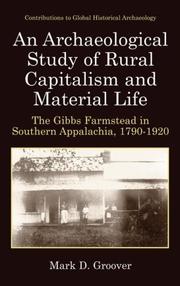| Listing 1 - 2 of 2 |
Sort by
|

ISBN: 1280618418 9786610618415 0306479176 0306475022 Year: 2003 Publisher: New York : Kluwer Academic Publishers,
Abstract | Keywords | Export | Availability | Bookmark
 Loading...
Loading...Choose an application
- Reference Manager
- EndNote
- RefWorks (Direct export to RefWorks)
Historical archaeology has largely focused on the study of early military sites and homes of upper class. Research on lower classes was viewed as a supplement to local histories documenting political, military and financial leaders of the 18th and 19th centuries. An Archaeological Study of Rural Capitalism and Material Life will be of interest to historical archaeologists, cultural anthropologists, social historians, and historical sociologists, especially researchers studying the influence of globalization and economic development upon rural regions like Appalachia.
Excavations (Archaeology) --- Material culture --- Farm life --- Family farms --- Agriculture --- German Americans --- History. --- Economic aspects --- Gibbs, Nicholas, --- Gibbs family. --- Homes and haunts --- Knox County (Tenn.) --- Appalachian Region, Southern --- Antiquities. --- Anthropology. --- Archaeology. --- History, general. --- Annals --- Auxiliary sciences of history --- Archeology --- Anthropology --- History --- Antiquities --- Human beings --- Farms --- Farms, Small --- Private plot agriculture --- Rural life --- Country life --- Culture --- Folklore --- Technology --- Farming --- Husbandry --- Industrial arts --- Life sciences --- Food supply --- Land use, Rural --- Archaeological digs --- Archaeological excavations --- Digs (Archaeology) --- Excavation sites (Archaeology) --- Ruins --- Sites, Excavation (Archaeology) --- Archaeology --- Appalachian Mountains, Southern --- Appalachians, Southern --- Southern Appalachian Mountains --- Southern Appalachian Region --- Southern Appalachians --- Knox Co., Tenn.

ISBN: 0801438098 0801488761 080146868X 1336207876 0801468671 9780801468681 9780801488764 9780801438097 9780801468674 9781336207875 Year: 2003 Publisher: Ithaca London Cornell University Press
Abstract | Keywords | Export | Availability | Bookmark
 Loading...
Loading...Choose an application
- Reference Manager
- EndNote
- RefWorks (Direct export to RefWorks)
Patrick Brantlinger here examines the commonly held nineteenth-century view that all "primitive" or "savage" races around the world were doomed sooner or later to extinction. Warlike propensities and presumed cannibalism were regarded as simultaneously noble and suicidal, accelerants of the downfall of other races after contact with white civilization. Brantlinger finds at the heart of this belief the stereotype of the self-exterminating savage, or the view that "savagery" is a sufficient explanation for the ultimate disappearance of "savages" from the grand theater of world history.Humanitarians, according to Brantlinger, saw the problem in the same terms of inevitability (or doom) as did scientists such as Charles Darwin and Thomas Henry Huxley as well as propagandists for empire such as Charles Wentworth Dilke and James Anthony Froude. Brantlinger analyzes the Irish Famine in the context of ideas and theories about primitive races in North America, Australia, New Zealand, and elsewhere. He shows that by the end of the nineteenth century, especially through the influence of the eugenics movement, extinction discourse was ironically applied to "the great white race" in various apocalyptic formulations. With the rise of fascism and Nazism, and with the gradual renewal of aboriginal populations in some parts of the world, by the 1930s the stereotypic idea of "fatal impact" began to unravel, as did also various more general forms of race-based thinking and of social Darwinism.
Eurocentrism. --- Genocide. --- Indigenous peoples. --- Social Darwinism. --- Autochtonen --- Darwinism [Social ] --- Darwinisme social --- Eurocentrism --- Eurocentrisme --- Genocide --- Génocide --- Inboorlingen --- Indigenous peoples --- Indigènes --- Inheemse bevolking --- Inheemsen --- Inlanders --- Native peoples --- Peuples indigènes --- Population autochtone --- Populations indigènes --- Sociaal Darwinisme --- Social Darwinism --- Volkenmoord --- Eurocentricity --- Cleansing, Ethnic --- Ethnic cleansing --- Ethnic purification --- Ethnocide --- Purification, Ethnic --- Darwinism, Social --- Aboriginal peoples --- Aborigines --- Indigenous populations --- Native races --- Ethnocentrism --- Crime --- Competition --- Social change --- Social conflict --- Social evolution --- Ethnology --- Adivasis --- extinction of primitive people, robert knox, alfred wallace, savage races, nineteenth century racialism, nineteenth century extinction discourse. --- Autochtones
| Listing 1 - 2 of 2 |
Sort by
|

 Search
Search Feedback
Feedback About UniCat
About UniCat  Help
Help News
News